

Reflective Learning: Thinking About the Way You Learn. Reflective learning involves actively monitoring and assessing your knowledge, abilities, and performance during the learning process, in order to improve the process and its associated outcomes.
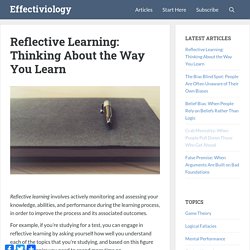
For example, if you’re studying for a test, you can engage in reflective learning by asking yourself how well you understand each of the topics that you’re studying, and based on this figure out which topics you need to spend more time on. Reflective learning can be beneficial in various ways and in various contexts, so it’s often worthwhile to engage in it. As such, in the following article you will learn more about reflective learning, and see how you can engage in it yourself, as well as how you can encourage others to engage in it. A Skill Strong Readers Share. Students in classrooms across the United States spend an estimated 85 percent of their school day on assignments that require reading texts.
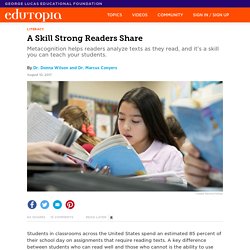
A key difference between students who can read well and those who cannot is the ability to use metacognition. Metacognition can be regarded as a conversation readers have with themselves about what they are reading. Metacognitive readers enjoy reading because they can find meaning in texts and think deeply to comprehend what they’re reading. Those who have not yet learned to be metacognitive often have trouble reading fluently and comprehending what they read. Virtually all students can learn how to become metacognitive readers when they are explicitly taught.
5 Strategies to Demystify the Learning Process for Struggling Students. Oakley recognizes that “many educators are not at all comfortable with or trained in neuroscience,” so she breaks down a few key principles that teachers can use in the classroom and share with students to help them demystify the learning process. 1.
The Hiker Brain vs. The Race Car Brain Start by teaching students the difference between focused and diffused thinking, says Oakley. When the brain is in focused mode, you can get started on the task at hand. 35 Psychology-Based Learning Strategies For Deeper Learning. 35 Psychology-Based Critical Thinking Strategies by Sara Briggs, opencolleges.edu.au Have you ever considered letting your students listen to hardcore punk while they take their mid-term exam?
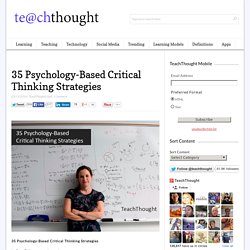
Decided to do away with Power Point presentations during your lectures? Urged your students to memorize more in order to remember more? If the answer is no, you may want to rethink your notions of psychology and its place in the learning environment. How to Teach Analysis Like a Boss – The Rhetor's Toolbox. In my last post, I made a case against the five paragraph essay as an appropriate analytical structure for high school students.
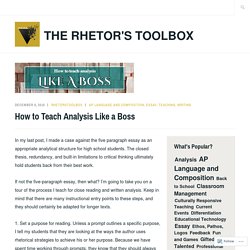
The closed thesis, redundancy, and built-in limitations to critical thinking ultimately hold students back from their best work. If not the five-paragraph essay, then what? I’m going to take you on a tour of the process I teach for close reading and written analysis. Keep in mind that there are many instructional entry points to these steps, and they should certainly be adapted for longer texts. 1.
8 Important Skills to Learn in Just Under 8 Hours Each. Scaffolding: A technique of learning - IB Speak. Boost Your Leadership Skills With The Feynman Technique. Have you ever wanted to become an expert in something but didn’t know the right approach?
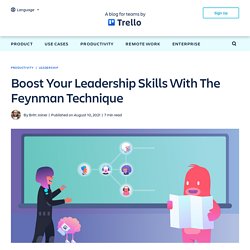
Or perhaps you’ve got an exam coming up and you need to make sure you’re crystal clear on the content? Being able to understand concepts and communicate them clearly is essential, no matter what you’re doing. As a leader, it’s important to be able to grow and share knowledge with those around you. But sometimes it’s overwhelming to think about really learning a subject. SuperMemo.com. True history The popular history of spaced repetition is full of myths and falsehoods.

This text is to tell you the true story. Teach the Seven Strategies of Highly Effective Readers. By: Elaine K.
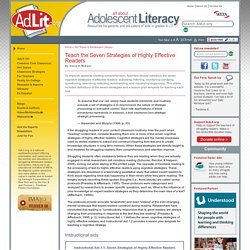
McEwan To improve students' reading comprehension, teachers should introduce the seven cognitive strategies of effective readers: activating, inferring, monitoring-clarifying, questioning, searching-selecting, summarizing, and visualizing-organizing. How to Read a Book: The Ultimate Guide by Mortimer Adler. Expo Views. The First 20 Hours - How to Learn Anything: Josh Kaufman at TEDxCSU. Marty Lobdell - Study Less Study Smart.
Microsoft OneNote - 2018 Detailed Tutorial. LEARNING. Memorabilities 2021. Memory. Note Minders. Autodidact. Critical Reading. How People Learn. On Learning. LMS. Note-taking. Study Guides. Educationally. Insight. Knowledge Skills.
Languages. Logicians. Mind Mapping. Lifelong Learning. Scott Young blog. Research Capabilities. Quotable. Writ. Wisdom.